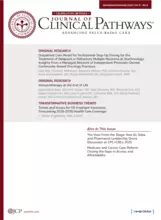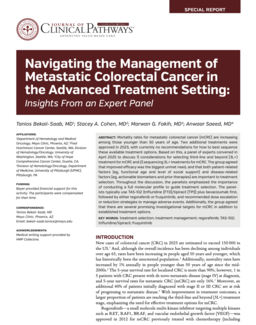Real-World Support for ICI Use in BRAF-Mutated Melanoma With CNS Involvement
At ASCO 2025, Dr Janet Espirito presented real-world evidence showing that patients with BRAF-mutated melanoma—including those with brain metastases—experienced comparable outcomes with frontline immune checkpoint inhibitors, supporting more inclusive clinical decision-making and advancing precision oncology.
Please introduce yourself by stating your name, title, and any relevant experience you’d like to share.
Janet Espirito, PharmD: My name is Janet Espirito. I'm a senior medical director with Ontada. I help support clinical and research efforts across our oncology organization.
Can you provide an overview of your study presented at ASCO 2025?
Espirito: Our poster was focused on real-world clinical outcomes of patients with BRAF-mutated melanoma, with or without brain metastasis.
Overall, melanoma cancer that has spread to the brain has typically been associated with poor prognosis. However, with newer therapies, we are seeing improved outcomes, which is good news. Additionally, over the past few years, we've been learning more about the biology of the disease and some of the different genomic alterations that can lead to melanoma.
This study was focused on patients with that specific genomic alteration, what we call BRAF-mutated melanoma. Specifically, we looked at patients with this particular genomic alteration and at what treatment patterns and outcomes look like among patients with and without brain metastases.
Overall, we were able to see similar outcomes among patients who were treated with frontline immune checkpoint inhibitor (ICI) therapies. It was encouraging to see that the prognosis was similar, even though patients had melanoma brain metastases when they were treated with this frontline therapy.
How might these real-world data influence clinical decision-making in settings where both ICI and targeted therapy are options for BRAF-mutated melanoma with brain involvement?
Espirito: This study specifically looked at patients with this mutation and also at patients with known brain metastases.
In terms of clinical decision-making, general clinical studies do not always include patients with brain metastases. When we look at published randomized controlled trials, often patients with brain metastases are excluded from those types of trials. These data help provide real-world evidence to show that we have information for patients who are treated with these therapies and have brain metastases, to help support clinical decision-making when providers are selecting therapeutic options for their patients and to help inform that clinical decision-making.
Given the comparable outcomes, do your findings support broader inclusion of patients with melanoma with brain metastases in standard pathways for frontline ICI treatment?
Espirito: These treatments are already part of clinical guidelines and pathways, but oftentimes guidelines and pathways may not include specific subsets of patients, such as patients with brain metastases.
It's always important to do these types of studies to help gather additional information. In terms of treatment pathways, physicians always need to take a look at each individual patient and all of their individual considerations. This was a retrospective observational study, which adds more information to the literature. It does help provide information to say, "This is a reasonable choice."
Your study mentions ongoing research into the role of the somatic mutational background. What are you hoping to uncover, and how might that inform future treatment strategies or patient stratification?
Espirito: As we learn more about the genomic alterations among patients with different types of cancer, it helps us to utilize precision medicine to select the best therapies that help target the specific genomic alterations. In terms of ongoing research, we are continuing to learn about all of the different types of genomic alterations and what the outcomes are among patients with the different types of genomic alterations to see if outcomes are the same or different.
So, in terms of treatment stratification, it may allow us to better select the precise therapies to target each individual patient's biology of disease. Whereas historically, we would just treat patients very similarly with the diagnosis, now, we can start to focus on their specific genomic alterations.













